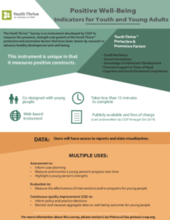Displaying 1321 - 1330 of 2503
This study tested the hypotheses that inverse relationships would exist between connectedness in three social domains (i.e., caregiver, peers, and school) and suicidal ideation over time.
The Center for the Study of Social Policy (CSSP) is proud to announce the launch of the Youth Thrive™ Survey on October 30, 2018. This instrument is a valid web-based survey that measures the presence, strength, and growth of the Youth Thrive™ Protective and Promotive Factors as proxy indicators of well-being.
To illustrate design and implementation of the Strategies for Enhancing Early Developmental Success (SEEDS) Preschool Program, aimed at promoting school readiness in families connected to the child welfare system, the current paper uses parent- and teacher-reported data to summarize the progress of three participating families with diverse histories and presenting issues.
This study examined whether children with Child Protective Services (CPS) involvement who were in foster care had more advanced receptive vocabulary than children with CPS involvement who resided with their birth parents.
In the current study, the authors examined whether children with Child Protective Services (CPS) involvement who were in foster care had more advanced receptive vocabulary than children with CPS involvement who resided with their birth parents.
"One in five children being raised by extended family members [in the US] — grandparents, aunts, uncles, cousins — live in an immigrant household, more than half a million children, a new report shows," says this article from the Huffington Post.
In the present study, the authors examined the effects of two types of initial short-term placements: emergency placements (lasting 1 to 5 days) and provisional placements (lasting 6 to 60 days) on the risks of re-entry into care in the four years following reunification.
This opinion piece from the New York Times presents alternatives to volunteering in, or donating to, orphanages.
This study sought to answer the question: How do the experiences of separation and reunification shape the well‐being of immigrant children?
The US state of Washington’s foster care system has been sending many young people in need of residential care and treatment to the Clarinda Academy, an institution in Iowa. This is a report by Disability Rights Washington (DRW) to expose the conditions and treatment experienced by Washington foster youth at this institution.


